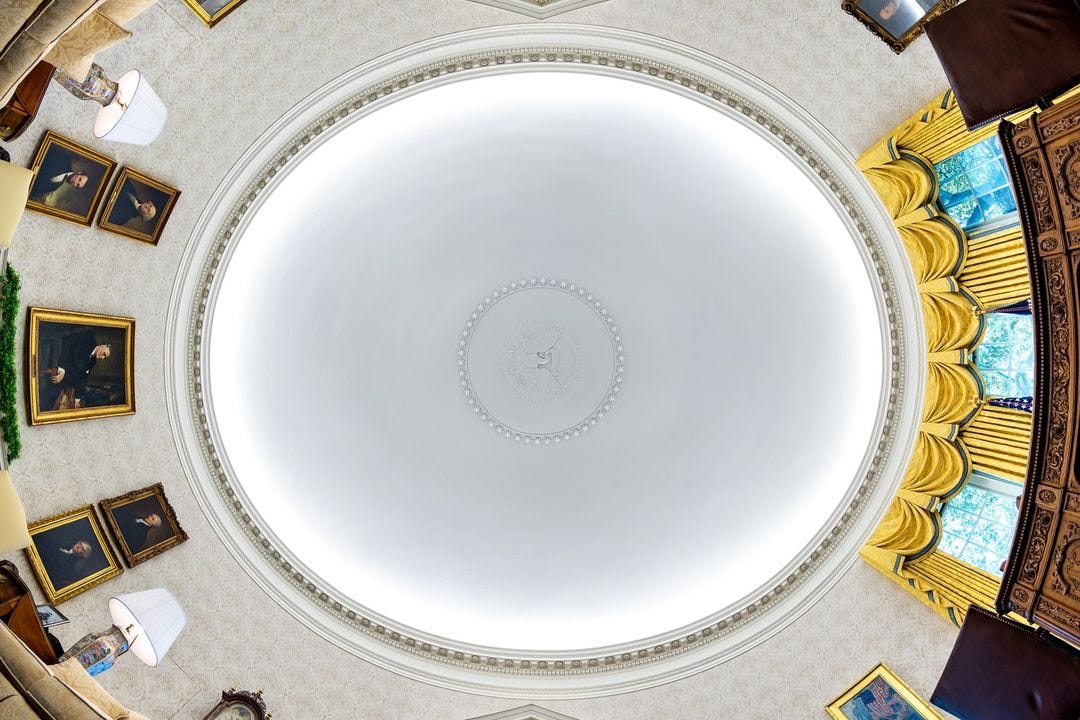Common sense
Stating the obvious forcefully and historically
There’s no debate. “Common Sense” was a smash hit in 1776. Six months before the Declaration of Independence, it made the moral and legal case for a new nation. It’s a founding document—a sermon in many ways—that’s rightfully taught at the National Constitution Center in Philadelphia.
That’s the institution and museum where Kamala Harris shook Donald Trump’s hand Tuesday night. I don’t have an original take about the debate that isn’t horse race coverage, which is childish. She “won the debate” like her predecessors did, but will it matter? He continues to ignore the political center and scrape for voters who want a dictator.
The commercials were a nice—albeit cringey—break. The television hosts thanked their guests, which was odd especially when Trump would speak about civil rights, immigration, and war. It should be absurd and disqualifying to say this, but I’ll say it like JD Vance once did: Trump speaks how National Socialists primed their supporters to hate one percent of the German population. It’s common sense.
Return to normalcy
World War II has its origins in World War I, which America was late to enter. Within a few months, Europe was entrenched in a grisly stalemate. Almost three years later, American doughboys landed in France to protect trade, neutrality, and make the world safe for democracy.
The next year, the war was over, peace had been made, and reparation schedules were soon set. Of course, war persisted overseas with revolutions. At home, there were strikes, riots and the beginning of McCarthyism and the Red Scare. Disillusionment was in the air and, as the 1920 election rolled around, it was time to go back.
America's present need is not heroics but healing; not nostrums but normalcy; not revolution but restoration; not agitation but adjustment; not surgery but serenity; not the dramatic but the dispassionate; not experiment but equipoise; not submergence in internationality but sustainment in triumphant nationality.
That speech helped Republican Warren Harding win more than 60% of the popular vote. That’s an unthinkable number now—in 2008, Barack Obama got 53% of the vote.
Normalcy, and the return to it, was a theme in the 1946 midterms after World War II and, on some level, the Clinton-Gore victory after the Cold War. It was in the foreground four years ago when Joe Biden promised to end the divisiveness of the Trump years and defeat the pandemic.
Normalcy is a product. Usually, it’s a retreat into a mythic past of splendid isolation and simplicity. Recently, it’s been a return to consensus politics of mythic compromise and back slapping.
A brief political history of abnormality
Obama’s margin of victory came down in 2012, but sent Republicans into a deep soul search. They delivered a post mortem and made immigration reform their top priority. Republican Sens. Marco Rubio and Ted Cruz helped broker a bipartisan Senate bill that was defeated by Republican infighting in the House.
The national government shutdown for two weeks, its first in 20 years.
Supreme Court Justice Antonin Scalia died and Merrick Garland was denied a hearing by Senate Republicans.
The Bush dynasty was eliminated from a presidential election. Jeb Bush’s son, George P. Bush, broke with his family and endorsed Trump. George P. Bush would lose his big race for Texas Attorney General in 2022, but he would support House Republicans when they removed Rep. Lynne Cheney from her No. 3 House leadership position.
In 2024, the Cheney family supports Harris. George W. Bush’s controversial Attorney General, Alberto Gonzalez, supports Harris.
Like mafia bosses in movies he likes and dictators he entertains, Trump rewards his friends with pardons, tax cuts, deregulation, and judicial appointments. He punishes challengers, be they friend, frenemy, foe, or windmill.
America’s 20th Century furniture, Hillary Clinton and Biden, were known quantities—like them or leave them. Now there’s Kamala Harris, a competent and qualified nominee, like it or leave it, with whom the country might break through the final and grandest ceiling. What’s on the other side?

A final note about focus
My four years at CNN were a challenge because I saw the news cycle obliterate cause and effect. Coverage churned through uncertainty and causality and left me bewildered. It was impossible to remember anything. By the time I observed one object or one idea, there was something else to occupy me.
It is not breaking news to say the national news media are for-profit multinational corporate conglomerates. They—and they alone—have the power to create and sustain focus on conflicts, stakes, and people.
This is not a secret. It is a solemn power that does not get enough discussion (though the Powers That Be by David Halberstam is a great place to start).
I yearn for more focus in the national news media. Sustained focus would look like a campaign of verifiable information, a preponderance of evidence, and an outline of stakes and consequences.
The good news is there’s precedent for it. At the time, it was brave and risky. It’s now timeless: The kind of common sense necessary to uphold and defend the Constitution.



